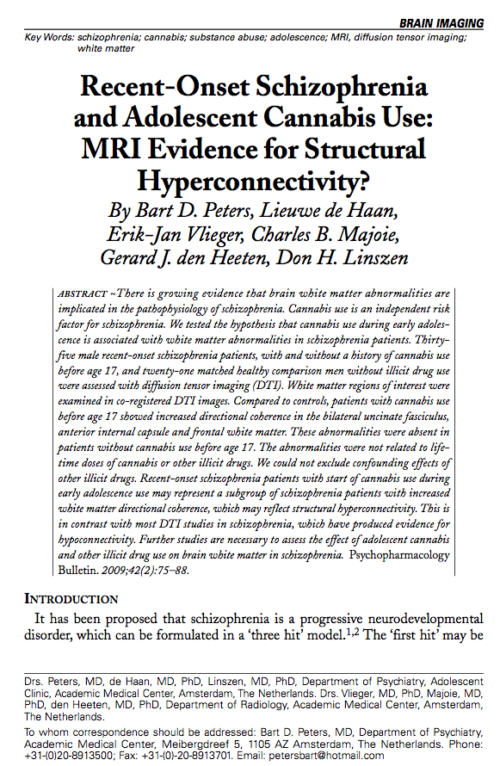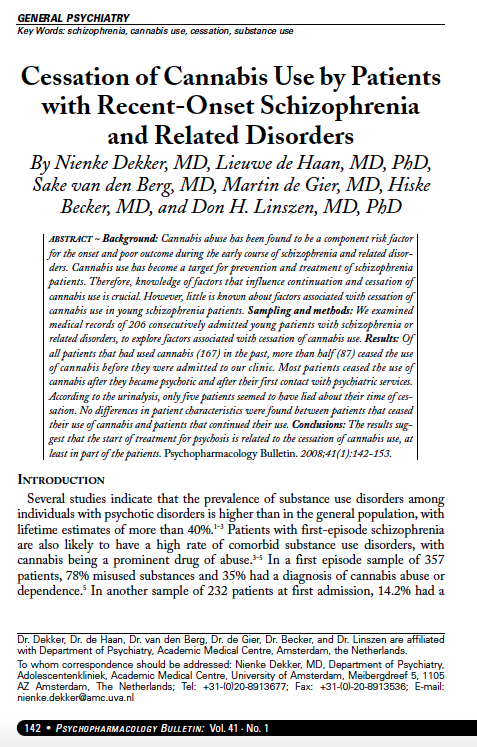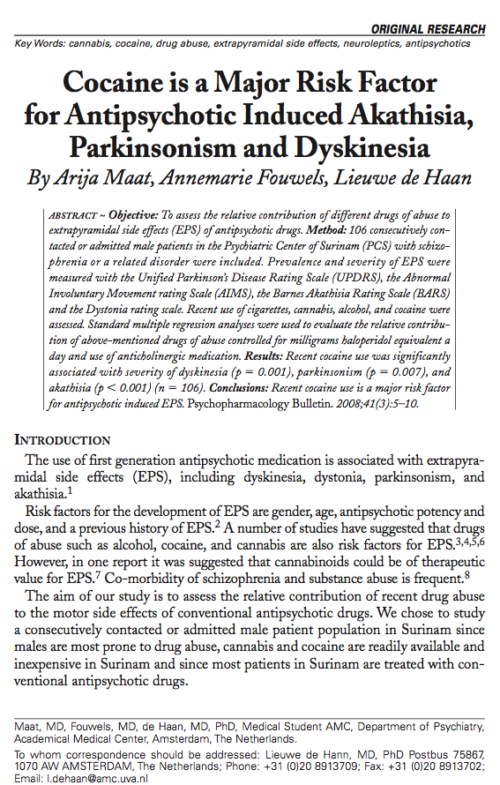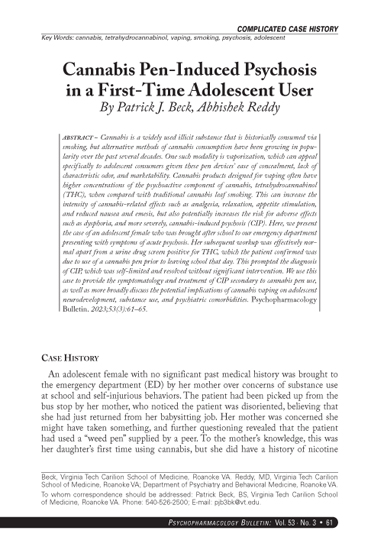Cannabis
How does marijuana affect the brain?
Marijuana has both short- and long-term effects on the brain.
Short-Term Effects
When a person smokes marijuana, THC quickly passes from the lungs into the bloodstream. The blood carries the chemical to the brain and other organs throughout the body. The body absorbs THC more slowly when the person eats or drinks it. In that case, he or she generally feels the effects after 30 minutes to 1 hour.
THC acts on specific brain cell receptors that ordinarily react to natural THC-like chemicals. These natural chemicals play a role in normal brain development and function.
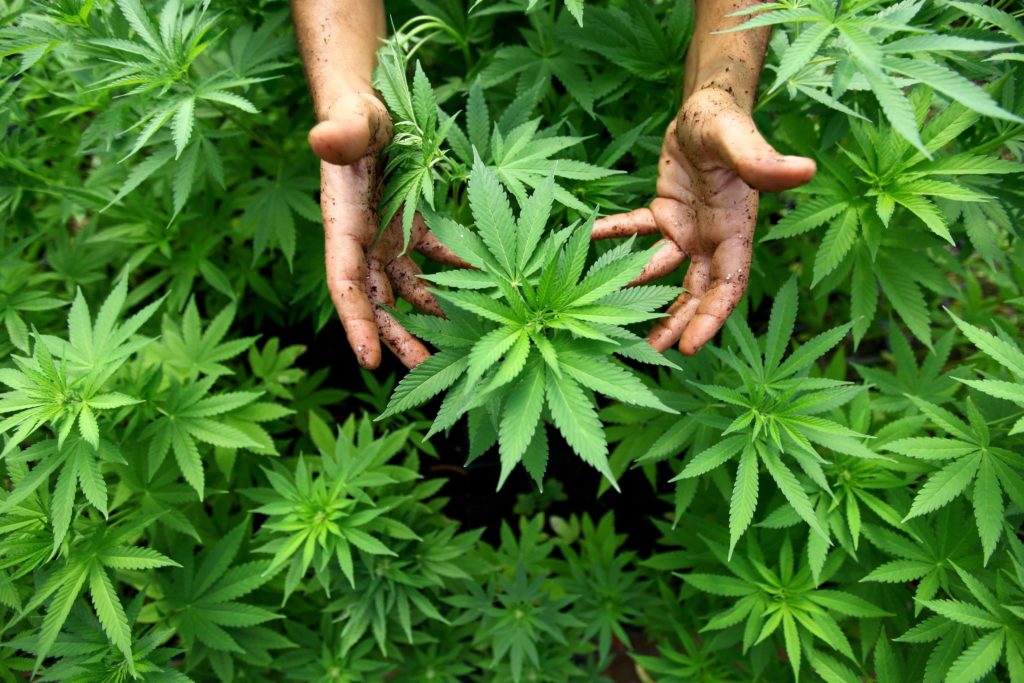
Marijuana overactivates parts of the brain that contain the highest number of these receptors. This causes the “high” that people feel. Other effects include:
- altered senses (for example, seeing brighter colors)
- altered sense of time
- changes in mood
- impaired body movement
- difficulty with thinking and problem-solving
- impaired memory
Long-Term Effects
Marijuana also affects brain development. When people begin using marijuana as teenagers, the drug may reduce thinking, memory, and learning functions and affect how the brain builds connections between the areas necessary for these functions. Marijuana’s effects on these abilities may last a long time or even be permanent.
For example, a study from New Zealand conducted in part by researchers at Duke University showed that people who started smoking marijuana heavily in their teens and had an ongoing marijuana use disorder lost an average of 8 IQ points between ages 13 and 38. The lost mental abilities didn’t fully return in those who quit marijuana as adults. Those who started smoking marijuana as adults didn’t show notable IQ declines.3However, recent results from two studies on twins didn’t support a causal relationship between marijuana use and IQ loss. Those who used marijuana did show a significant decline in verbal ability (equivalent to 4 IQ points) and in general knowledge between the preteen years and early adulthood. However, no predictable difference was found between twins when one used marijuana and one didn’t. This suggests that the IQ decline may be caused by shared familial factors (e.g., genetics, family environment), and not by marijuana use itself.4
A Rise in Marijuana’s THC Levels
The amount of THC in marijuana has been increasing steadily over the past few decades.5 For a person who is new to marijuana use, this may mean exposure to higher THC levels with a greater chance of a harmful reaction. Higher THC levels may explain the rise in emergency room visits involving marijuana use.
The popularity of edibles also increases the chance of harmful reactions. Edibles take longer to digest and produce a high. Therefore, people may consume more to feel the effects faster, leading to dangerous results.
Higher THC levels may mean a greater risk for addiction if people are regularly exposing themselves to high doses.
What are the other health effects of marijuana?
Marijuana use may have a wide range of effects, both physical and mental.
Physical Effects
- Breathing problems. Marijuana smoke irritates the lungs, and people who smoke marijuana frequently can have the same breathing problems as those who smoke tobacco. These problems include daily cough and phlegm, more frequent lung illness, and a higher risk of lung infections. Researchers still don’t know whether people who smoke marijuana have a higher risk for lung cancer.
- Increased heart rate. Marijuana raises heart rate for up to 3 hours after smoking. This effect may increase the chance of heart attack. Older people and those with heart problems may be at higher risk.
- Problems with child development during and after pregnancy. Marijuana use during pregnancy is linked to lower birth weight6 and increased risk of both brain and behavioral problems in babies. If a pregnant woman uses marijuana, the drug may affect certain developing parts of the fetus’s brain. Resulting challenges for the child may include problems with attention,7 memory, and problem-solving.8 Some research also suggests that moderate amounts of THC are excreted into the breast milk of nursing mothers.9 With regular use, THC can reach amounts in breast milk that could affect the baby’s developing brain. More research is needed. Read ourMarijuana Research Report for more information about marijuana and pregnancy.
Mental Effects of Cannabis
Long-term marijuana use has been linked to mental illness in some users, such as:
- temporary hallucinations—sensations and images that seem real though they are not
- temporary paranoia—extreme and unreasonable distrust of others
- worsening symptoms in patients with schizophrenia (a severe mental disorder with symptoms such as hallucinations, paranoia, and disorganized thinking)
Marijuana use has also been linked to other mental health problems, such as depression, anxiety, and suicidal thoughts among teens. However, study findings have been mixed.
What are the effects of inhaling secondhand marijuana smoke?
Failing a Drug Test?
While it’s possible to fail a drug test after inhaling secondhand marijuana smoke, it’s unlikely. Studies show that very little THC is released in the air when a person exhales. Findings from studies suggest that, unless people are in an enclosed room, breathing in lots of smoke for hours, they aren’t likely to fail a drug test.12,13 Even if some THC were found in the blood, it wouldn’t be enough to fail a test.
Getting a Contact High?
Similarly, it’s unlikely that secondhand marijuana smoke would give anyone a contact high. Studies have shown that if a person gets a contact high, it’s also under extreme conditions (breathing in lots of marijuana smoke for hours in an enclosed room).14
Other Health Effects?
More research is needed to know if secondhand marijuana smoke has similar health risks as secondhand tobacco smoke. A recent study on rats suggests that secondhand marijuana smoke can do as much damage to the heart and blood vessels as secondhand tobacco smoke.15 But researchers haven’t performed that study on humans. What they do know is that the toxins and tar found in marijuana smoke could affect vulnerable people, such as children or those with asthma.


